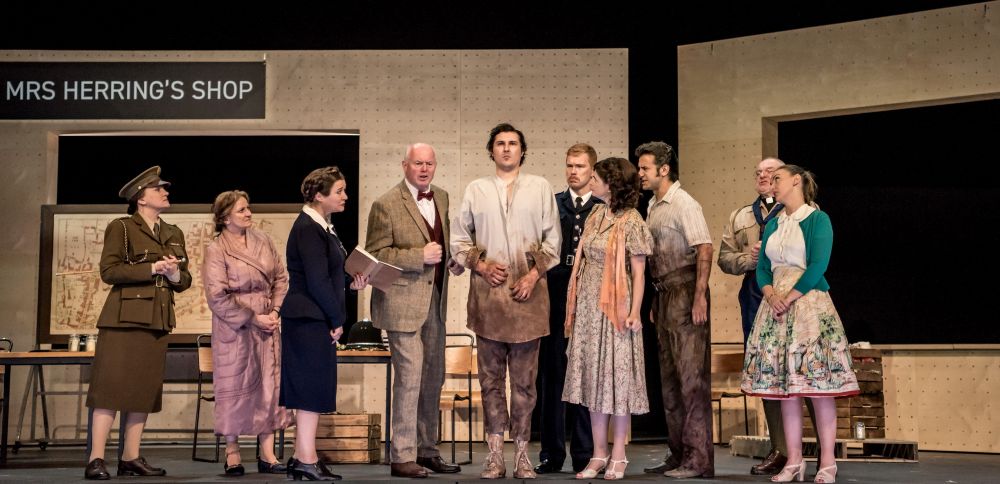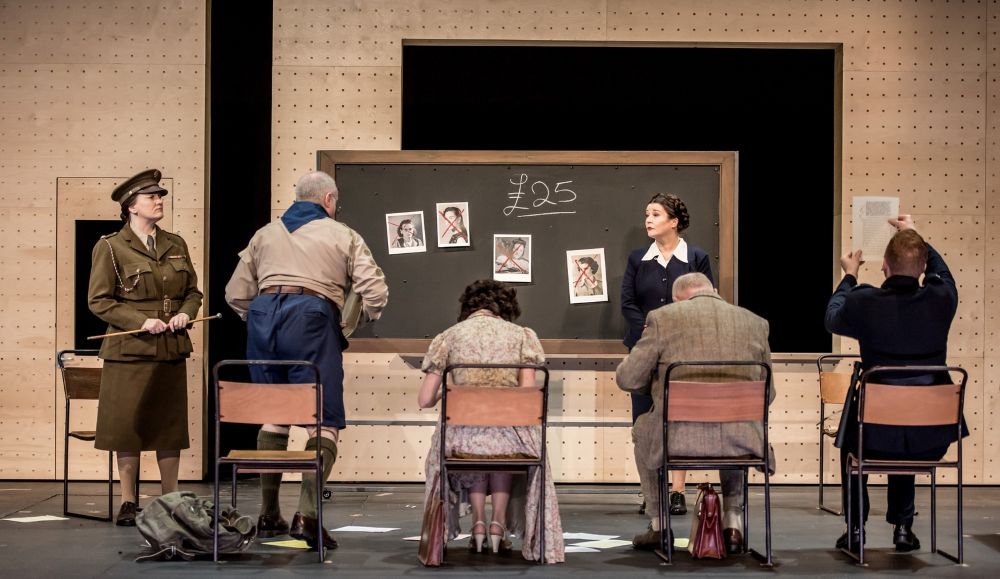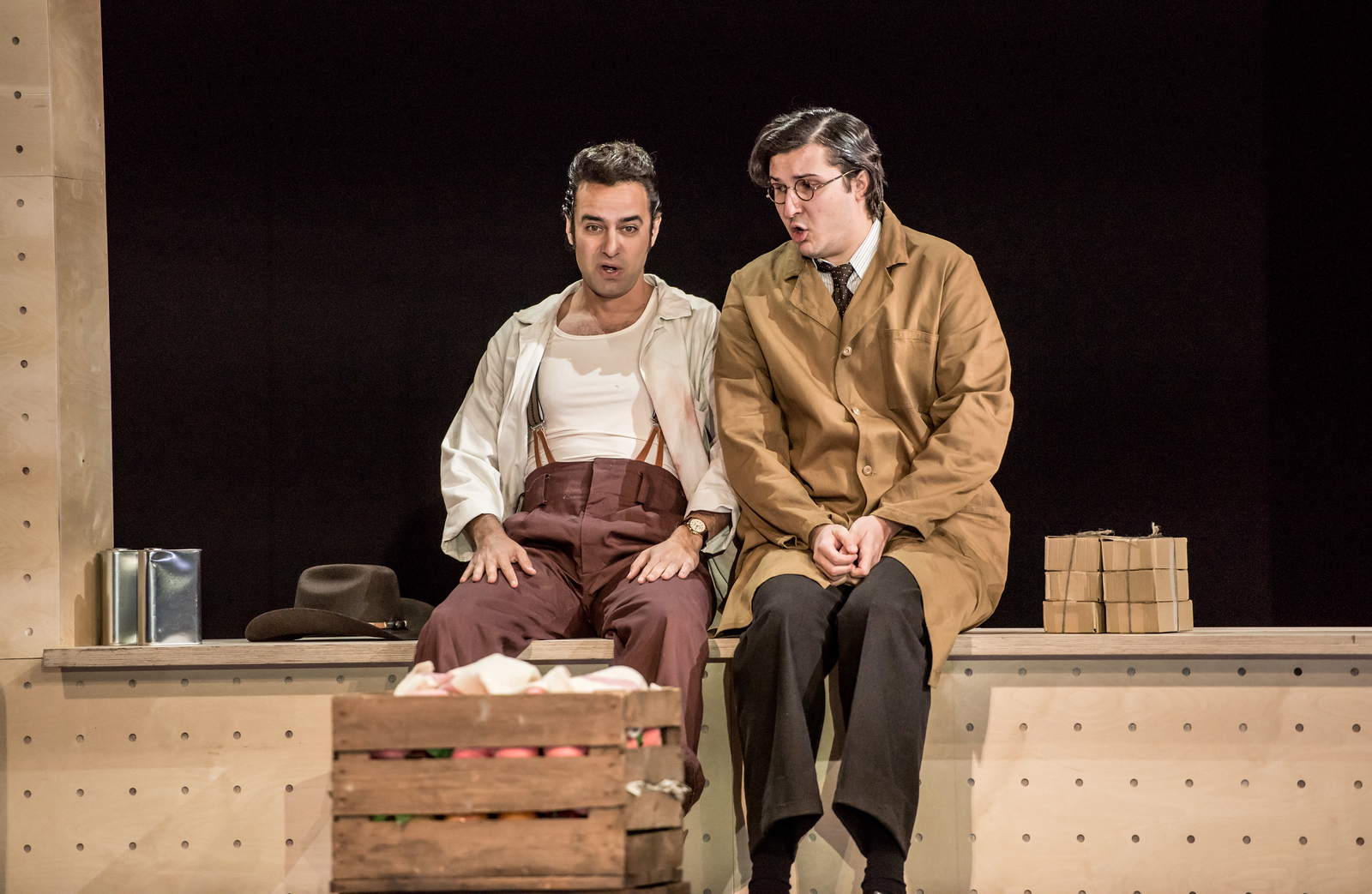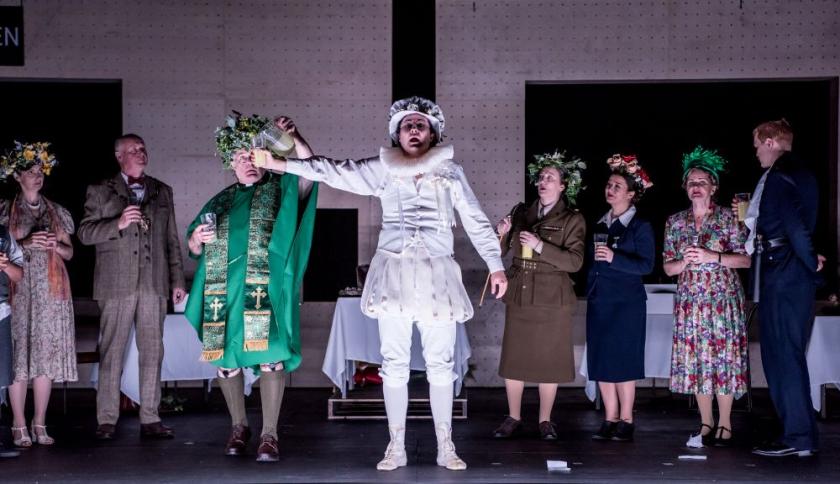Britten’s Albert Herring is one of the great 20th century comic operas; only Puccini’s Gianni Schicchi and Barry’s The Importance of Being Earnest draw such whole-hearted laughter. If it’s never been performed in the London Coliseum before, that’s because it’s a chamber opera with a 14-piece ensemble in the pit. This clever compromise shouldn’t be going to Lowry, Salford for its third and fourth performances but touring the country in much smaller houses.
Even so, it works at ENO’s London home, just as Britten’s other portmanteau operas, The Rape of Lucretia, devastating in Graham Vick’s 1987 stunner, and The Turn of the Screw, a candidate for best production of 2024 from director Isabella Bywater, have done before it. But then I've never seen the Maupassant-adapted tale of a virginal, shy boy elected May King in the absence of suitable village girls fail on stage. Its infallibly witty libretto by Eric Crozier – the best in Britten's operas other than WH Auden's more contentious take on the American myth of Paul Bunyan – had mostly perfect diction from the singing cast of 13, but it's Britten's sense of dramatic timing, equal to Puccini, and his huge variety of invention which carry the day.  As with The Turn of the Screw, I doubt if many in the audience were aware that they weren't getting a full orchestra, so brilliantly does Britten score for every instrument. Daniel Cohen conducts with an ideal mix of focus and momentum, giving space to outstanding solos from Timothy Ellis (horn) and the poignant crepuscular duet from Clara Wickes on alto flute and Barnaby Robson on bass clarinet. The interlude which settles to it is atmospherically played in the dark at the beginning of this second half, adding to the new-found depths in the comedy; the additional stage manager (Ashton Hall) in charge of the 50s clad cast earns his salt as he tries in vain to control the crazy orgy of food consumption which here brings down the curtain on ENO's Part One.
As with The Turn of the Screw, I doubt if many in the audience were aware that they weren't getting a full orchestra, so brilliantly does Britten score for every instrument. Daniel Cohen conducts with an ideal mix of focus and momentum, giving space to outstanding solos from Timothy Ellis (horn) and the poignant crepuscular duet from Clara Wickes on alto flute and Barnaby Robson on bass clarinet. The interlude which settles to it is atmospherically played in the dark at the beginning of this second half, adding to the new-found depths in the comedy; the additional stage manager (Ashton Hall) in charge of the 50s clad cast earns his salt as he tries in vain to control the crazy orgy of food consumption which here brings down the curtain on ENO's Part One.
Director-designer Antony McDonald maintains a Brechtian alienation about the very basic – and eminently tourable – set, but rounds out the characters – even the village committee of "pious old faces delighting in sin", who are stereotypical but still with us (as a student of mine pointed out, in small communities many folk tend to slip into unconscious self-parody in the roles they take on).  At the start we see Florence Pike (Carolyn Dobbin, excellent in voice and diction, pictured above by blackboard) not satirically flustered as the music suggests, but in control, and snatching a quick fag during duties for mistress Lady Billows (the "nasty masculine smell" the grande dame scents is, of course, Florence's cigarette). It might sound a bit of a backhanded compliment to Emma Bell (pictured above left) to say that she's never been better than as the grandiose, trumpeting sergeant-major of a Lady (the military gear and the binoculars are inspired). Among the townsfolk who come to discuss the May Day totem, Aoife Miskelly as the twittering schoolma'am Miss Wordsworth, Eddie Wade as a vicar with a secret, seen pursuing youth with a bag of sweets in the first interlude and Mark Le Brocq as a clarion shopkeeper trading stockings on the black market are ideal, Andri Björn Róbertsson less than bass-y as caricatural Sergeant Budd who nevertheless comes up with the right idea for a May King (the original casting was Willard White).
At the start we see Florence Pike (Carolyn Dobbin, excellent in voice and diction, pictured above by blackboard) not satirically flustered as the music suggests, but in control, and snatching a quick fag during duties for mistress Lady Billows (the "nasty masculine smell" the grande dame scents is, of course, Florence's cigarette). It might sound a bit of a backhanded compliment to Emma Bell (pictured above left) to say that she's never been better than as the grandiose, trumpeting sergeant-major of a Lady (the military gear and the binoculars are inspired). Among the townsfolk who come to discuss the May Day totem, Aoife Miskelly as the twittering schoolma'am Miss Wordsworth, Eddie Wade as a vicar with a secret, seen pursuing youth with a bag of sweets in the first interlude and Mark Le Brocq as a clarion shopkeeper trading stockings on the black market are ideal, Andri Björn Róbertsson less than bass-y as caricatural Sergeant Budd who nevertheless comes up with the right idea for a May King (the original casting was Willard White).
Kicking against the pricks in Scene Two are Dan D'Souza's perfect teddy-boy butcher's assistant Sid (pictured below with Casper Singh), seemingly quite into the erotic teasing of young Albert, and Anna Elizabeth Cooper's Nancy, not always audible here but better later. The schoolgirls, Abigail Sinclair's Emmy and Natasha Oldbury, are old enough to be provocative, in a lively trio of naughtiness crowned by Henry Karp's lovable mug as Harry. Caspar Singh is a big and intelligent-seeming Albert – maybe his lack of success at school was because he was being kept under, possibly bullied. Though the tenor voice isn't big, he inflects all he needs to in the loaded Act 2, Scene 2 monologue. His flustered mum is Leah-Marian Jones, also excellent (where's she been all this time?).  In short, then, what's not to like? The costumes and floral wreaths fill in the gaps and the colour absent from the set; ensembles are crisp and clear, with so much at the front of the stage – would that the recent Carmen on an uncomfortably open set showed the same intelligence on that front – and the final sequence is perfect, from a queasily funny-serious Passacaglia ("In the midst of life is death") followed by Albert putting everyone in their place. How perfectly McDonald hints at the "worse" of the night's escapades by having him kiss not only Nancy but also Sid full on the mouth. A future liberated triangle, perhaps? Sadly, there's only one more London performance; don't miss it, or see one of the two in Manchester. Have a nice peach!
In short, then, what's not to like? The costumes and floral wreaths fill in the gaps and the colour absent from the set; ensembles are crisp and clear, with so much at the front of the stage – would that the recent Carmen on an uncomfortably open set showed the same intelligence on that front – and the final sequence is perfect, from a queasily funny-serious Passacaglia ("In the midst of life is death") followed by Albert putting everyone in their place. How perfectly McDonald hints at the "worse" of the night's escapades by having him kiss not only Nancy but also Sid full on the mouth. A future liberated triangle, perhaps? Sadly, there's only one more London performance; don't miss it, or see one of the two in Manchester. Have a nice peach!














Add comment